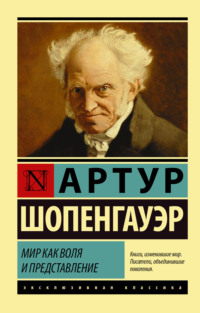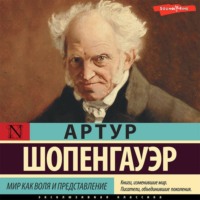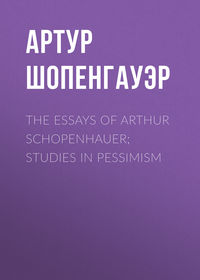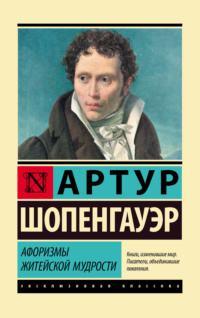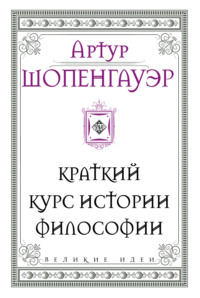 полная версия
полная версияThe World as Will and Idea (Vol. 1 of 3)
After all this we hope there will be no doubt that the evidence of mathematics, which has become the pattern and symbol of all evidence, rests essentially not upon demonstration, but upon immediate perception, which is thus here, as everywhere else, the ultimate ground and source of truth. Yet the perception which lies at the basis of mathematics has a great advantage over all other perception, and therefore over empirical perception. It is a priori, and therefore independent of experience, which is always given only in successive parts; therefore everything is equally near to it, and we can start either from the reason or from the consequent, as we please. Now this makes it absolutely reliable, for in it the consequent is known from the reason, and this is the only kind of knowledge that has necessity; for example, the equality of the sides is known as established by the equality of the angles. All empirical perception, on the other hand, and the greater part of experience, proceeds conversely from the consequent to the reason, and this kind of knowledge is not infallible, for necessity only attaches to the consequent on account of the reason being given, and no necessity attaches to the knowledge of the reason from the consequent, for the same consequent may follow from different reasons. The latter kind of knowledge is simply induction, i. e., from many consequents which point to one reason, the reason is accepted as certain; but as the cases can never be all before us, the truth here is not unconditionally certain. But all knowledge through sense-perception, and the great bulk of experience, has only this kind of truth. The affection of one of the senses induces the understanding to infer a cause of the effect, but, as a conclusion from the consequent to the reason is never certain, illusion, which is deception of the senses, is possible, and indeed often occurs, as was pointed out above. Only when several of the senses, or it may be all the five, receive impressions which point to the same cause, the possibility of illusion is reduced to a minimum; but yet it still exists, for there are cases, for example, the case of counterfeit money, in which all the senses are deceived. All empirical knowledge, and consequently the whole of natural science, is in the same position, except only the pure, or as Kant calls it, metaphysical part of it. Here also the causes are known from the effects, consequently all natural philosophy rests upon hypotheses, which are often false, and must then gradually give place to more correct ones. Only in the case of purposely arranged experiments, knowledge proceeds from the cause to the effect, that is, it follows the method that affords certainty; but these experiments themselves are undertaken in consequence of hypotheses. Therefore, no branch of natural science, such as physics, or astronomy, or physiology could be discovered all at once, as was the case with mathematics and logic, but required and requires the collected and compared experiences of many centuries. In the first place, repeated confirmation in experience brings the induction, upon which the hypothesis rests, so near completeness that in practice it takes the place of certainty, and is regarded as diminishing the value of the hypothesis, its source, just as little as the incommensurability of straight and curved lines diminishes the value of the application of geometry, or that perfect exactness of the logarithm, which is not attainable, diminishes the value of arithmetic. For as the logarithm, or the squaring of the circle, approaches infinitely near to correctness through infinite fractions, so, through manifold experience, the induction, i. e., the knowledge of the cause from the effects, approaches, not infinitely indeed, but yet so near mathematical evidence, i. e., knowledge of the effects from the cause, that the possibility of mistake is small enough to be neglected, but yet the possibility exists; for example, a conclusion from an indefinite number of cases to all cases, i. e., to the unknown ground on which all depend, is an induction. What conclusion of this kind seems more certain than that all men have the heart on the left side? Yet there are extremely rare and quite isolated exceptions of men who have the heart upon the right side. Sense-perception and empirical science have, therefore, the same kind of evidence. The advantage which mathematics, pure natural science, and logic have over them, as a priori knowledge, rests merely upon this, that the formal element in knowledge upon which all that is a priori is based, is given as a whole and at once, and therefore in it we can always proceed from the cause to the effect, while in the former kind of knowledge we are generally obliged to proceed from the effect to the cause. In other respects, the law of causality, or the principle of sufficient reason of change, which guides empirical knowledge, is in itself just as certain as the other forms of the principle of sufficient reason which are followed by the a priori sciences referred to above. Logical demonstrations from concepts or syllogisms have the advantage of proceeding from the reason to the consequent, just as much as knowledge through perception a priori, and therefore in themselves, i. e., according to their form, they are infallible. This has greatly assisted to bring demonstration in general into such esteem. But this infallibility is merely relative; the demonstration merely subsumes under the first principles of the science, and it is these which contain the whole material truth of science, and they must not themselves be demonstrated, but must be founded on perception. In the few a priori sciences we have named above, this perception is pure, but everywhere else it is empirical, and is only raised to universality through induction. If, then, in the empirical sciences also, the particular is proved from the general, yet the general, on the other hand, has received its truth from the particular; it is only a store of collected material, not a self-constituted foundation.
So much for the foundation of truth. Of the source and possibility of error many explanations have been tried since Plato's metaphorical solution of the dove-cot where the wrong pigeons are caught, &c. (Theætetus, p. 167, et seq.) Kant's vague, indefinite explanation of the source of error by means of the diagram of diagonal motion, will be found in the “Critique of Pure Reason,” p. 294 of the first edition, and p. 350 of the fifth. As truth is the relation of a judgment to its ground of knowledge, it is always a problem how the person judging can believe that he has such a ground of knowledge and yet not have it; that is to say, how error, the deception of reason, is possible. I find this possibility quite analogous to that of illusion, or the deception of the understanding, which has been explained above. My opinion is (and this is what gives this explanation its proper place here) that every error is an inference from the consequent to the reason, which indeed is valid when we know that the consequent has that reason and can have no other; but otherwise is not valid. The person who falls into error, either attributes to a consequent a reason which it cannot have, in which case he shows actual deficiency of understanding, i. e., deficiency in the capacity for immediate knowledge of the connection between the cause and the effect, or, as more frequently happens, he attributes to the effect a cause which is possible, but he adds to the major proposition of the syllogism, in which he infers the cause from the effect, that this effect always results only from this cause. Now he could only be assured of this by a complete induction, which, however, he assumes without having made it. This “always” is therefore too wide a concept, and instead of it he ought to have used “sometimes” or “generally.” The conclusion would then be problematical, and therefore not erroneous. That the man who errs should proceed in this way is due either to haste, or to insufficient knowledge of what is possible, on account of which he does not know the necessity of the induction that ought to be made. Error then is quite analogous to illusion. Both are inferences from the effect to the cause; the illusion brought about always in accordance with the law of causality, and by the understanding alone, thus directly, in perception itself; the error in accordance with all the forms of the principle of sufficient reason, and by the reason, thus in thought itself; yet most commonly in accordance with the law of causality, as will appear from the three following examples, which may be taken as types or representatives of the three kinds of error. (1.) The illusion of the senses (deception of the understanding) induces error (deception of the reason); for example, if one mistakes a painting for an alto-relief, and actually takes it for such; the error results from a conclusion from the following major premise: “If dark grey passes regularly through all shades to white; the cause is always the light, which strikes differently upon projections and depressions, ergo– .” (2.) “If there is no money in my safe, the cause is always that my servant has got a key for it: ergo– .” (3.) “If a ray of sunlight, broken through a prism, i. e., bent up or down, appears as a coloured band instead of round and white as before, the cause must always be that light consists of homogeneous rays, differently coloured and refrangible to different degrees, which, when forced asunder on account of the difference of their refrangibility, give an elongated and variously-coloured spectrum: ergo – bibamus!” – It must be possible to trace every error to such a conclusion, drawn from a major premise which is often only falsely generalised, hypothetical, and founded on the assumption that some particular cause is that of a certain effect. Only certain mistakes in counting are to be excepted, and they are not really errors, but merely mistakes. The operation prescribed by the concepts of the numbers has not been carried out in pure intuition or perception, in counting, but some other operation instead of it.
As regards the content of the sciences generally, it is, in fact, always the relation of the phenomena of the world to each other, according to the principle of sufficient reason, under the guidance of the why, which has validity and meaning only through this principle. Explanation is the establishment of this relation. Therefore explanation can never go further than to show two ideas standing to each other in the relation peculiar to that form of the principle of sufficient reason which reigns in the class to which they belong. If this is done we cannot further be asked the question, why: for the relation proved is that one which absolutely cannot be imagined as other than it is, i. e., it is the form of all knowledge. Therefore we do not ask why 2 + 2 = 4; or why the equality of the angles of a triangle determines the equality of the sides; or why its effect follows any given cause; or why the truth of the conclusion is evident from the truth of the premises. Every explanation which does not ultimately lead to a relation of which no “why” can further be demanded, stops at an accepted qualitas occulta; but this is the character of every original force of nature. Every explanation in natural science must ultimately end with such a qualitas occulta, and thus with complete obscurity. It must leave the inner nature of a stone just as much unexplained as that of a human being; it can give as little account of the weight, the cohesion, the chemical qualities, &c., of the former, as of the knowing and acting of the latter. Thus, for example, weight is a qualitas occulta, for it can be thought away, and does not proceed as a necessity from the form of knowledge; which, on the contrary, is not the case with the law of inertia, for it follows from the law of causality, and is therefore sufficiently explained if it is referred to that law. There are two things which are altogether inexplicable, – that is to say, do not ultimately lead to the relation which the principle of sufficient reason expresses. These are, first, the principle of sufficient reason itself in all its four forms, because it is the principle of all explanation, which has meaning only in relation to it; secondly, that to which this principle does not extend, but which is the original source of all phenomena; the thing-in-itself, the knowledge of which is not subject to the principle of sufficient reason. We must be content for the present not to understand this thing-in-itself, for it can only be made intelligible by means of the following book, in which we shall resume this consideration of the possible achievements of the sciences. But at the point at which natural science, and indeed every science, leaves things, because not only its explanation of them, but even the principle of this explanation, the principle of sufficient reason, does not extend beyond this point; there philosophy takes them up and treats them after its own method, which is quite distinct from the method of science. In my essay on the principle of sufficient reason, § 51, I have shown how in the different sciences the chief guiding clue is one or other form of that principle; and, in fact, perhaps the most appropriate classification of the sciences might be based upon this circumstance. Every explanation arrived at by the help of this clue is, as we have said, merely relative; it explains things in relation to each other, but something which indeed is presupposed is always left unexplained. In mathematics, for example, this is space and time; in mechanics, physics, and chemistry it is matter, qualities, original forces and laws of nature; in botany and zoology it is the difference of species, and life itself; in history it is the human race with all its properties of thought and will: in all it is that form of the principle of sufficient reason which is respectively applicable. It is peculiar to philosophy that it presupposes nothing as known, but treats everything as equally external and a problem; not merely the relations of phenomena, but also the phenomena themselves, and even the principle of sufficient reason to which the other sciences are content to refer everything. In philosophy nothing would be gained by such a reference, as one member of the series is just as external to it as another; and, moreover, that kind of connection is just as much a problem for philosophy as what is joined together by it, and the latter again is just as much a problem after its combination has been explained as before it. For, as we have said, just what the sciences presuppose and lay down as the basis and the limits of their explanation, is precisely and peculiarly the problem of philosophy, which may therefore be said to begin where science ends. It cannot be founded upon demonstrations, for they lead from known principles to unknown, but everything is equally unknown and external to philosophy. There can be no principle in consequence of which the world with all its phenomena first came into existence, and therefore it is not possible to construct, as Spinoza wished, a philosophy which demonstrates ex firmis principiis. Philosophy is the most general rational knowledge, the first principles of which cannot therefore be derived from another principle still more general. The principle of contradiction establishes merely the agreement of concepts, but does not itself produce concepts. The principle of sufficient reason explains the connections of phenomena, but not the phenomena themselves; therefore philosophy cannot proceed upon these principles to seek a causa efficiens or a causa finalis of the whole world. My philosophy, at least, does not by any means seek to know whence or wherefore the world exists, but merely what the world is. But the why is here subordinated to the what, for it already belongs to the world, as it arises and has meaning and validity only through the form of its phenomena, the principle of sufficient reason. We might indeed say that every one knows what the world is without help, for he is himself that subject of knowledge of which the world is the idea; and so far this would be true. But that knowledge is empirical, is in the concrete; the task of philosophy is to reproduce this in the abstract to raise to permanent rational knowledge the successive changing perceptions, and in general, all that is contained under the wide concept of feeling and merely negatively defined as not abstract, distinct, rational knowledge. It must therefore consist of a statement in the abstract, of the nature of the whole world, of the whole, and of all the parts. In order then that it may not lose itself in the endless multitude of particular judgments, it must make use of abstraction and think everything individual in the universal, and its differences also in the universal. It must therefore partly separate and partly unite, in order to present to rational knowledge the whole manifold of the world generally, according to its nature, comprehended in a few abstract concepts. Through these concepts, in which it fixes the nature of the world, the whole individual must be known as well as the universal, the knowledge of both therefore must be bound together to the minutest point. Therefore the capacity for philosophy consists just in that in which Plato placed it, the knowledge of the one in the many, and the many in the one. Philosophy will therefore be a sum-total of general judgments, whose ground of knowledge is immediately the world itself in its entirety, without excepting anything; thus all that is to be found in human consciousness; it will be a complete recapitulation, as it were, a reflection, of the world in abstract concepts, which is only possible by the union of the essentially identical in one concept and the relegation of the different to another. This task was already prescribed to philosophy by Bacon of Verulam when he said: ea demum vera est philosophia, quae mundi ipsius voces fidelissime reddit, et veluti dictante mundo conscripta est, et nihil aliud est, quam ejusdem simulacrum et reflectio, neque addit quidquam de proprio, sed tantum iterat et resonat (De Augm. Scient., L. 2, c. 13). But we take this in a wider sense than Bacon could then conceive.
The agreement which all the sides and parts of the world have with each other, just because they belong to a whole, must also be found in this abstract copy of it. Therefore the judgments in this sum-total could to a certain extent be deduced from each other, and indeed always reciprocally so deduced. Yet to make the first judgment possible, they must all be present, and thus implied as prior to it in the knowledge of the world in the concrete, especially as all direct proof is more certain than indirect proof; their harmony with each other by virtue of which they come together into the unity of one thought, and which arises from the harmony and unity of the world of perception itself, which is their common ground of knowledge, is not therefore to be made use of to establish them, as that which is prior to them, but is only added as a confirmation of their truth. This problem itself can only become quite clear in being solved.23
§ 16. After this full consideration of reason as a special faculty of knowledge belonging to man alone, and the results and phenomena peculiar to human nature brought about by it, it still remains for me to speak of reason, so far as it is the guide of human action, and in this respect may be called practical. But what there is to say upon this point has found its place elsewhere in the appendix to this work, where I controvert the existence of the so-called practical reason of Kant, which he (certainly very conveniently) explained as the immediate source of virtue, and as the seat of an absolute (i. e., fallen from heaven) imperative. The detailed and thorough refutation of this Kantian principle of morality I have given later in the “Fundamental Problems of Ethics.” There remains, therefore, but little for me to say here about the actual influence of reason, in the true sense of the word, upon action. At the commencement of our treatment of reason we remarked, in general terms, how much the action and behaviour of men differs from that of brutes, and that this difference is to be regarded as entirely due to the presence of abstract concepts in consciousness. The influence of these upon our whole existence is so penetrating and significant that, on account of them, we are related to the lower animals very much as those animals that see are related to those that have no eyes (certain larvae, worms, and zoophytes). Animals without eyes know only by touch what is immediately present to them in space, what comes into contact with them; those which see, on the contrary, know a wide circle of near and distant objects. In the same way the absence of reason confines the lower animals to the ideas of perception, i. e., the real objects which are immediately present to them in time; we, on the contrary, on account of knowledge in the abstract, comprehend not only the narrow actual present, but also the whole past and future, and the wide sphere of the possible; we view life freely on all its sides, and go far beyond the present and the actual. Thus what the eye is in space and for sensuous knowledge, reason is, to a certain extent, in time and for inner knowledge. But as the visibility of objects has its worth and meaning only in the fact that it informs us of their tangibility, so the whole worth of abstract knowledge always consists in its relation to what is perceived. Therefore men naturally attach far more worth to immediate and perceived knowledge than to abstract concepts, to that which is merely thought; they place empirical knowledge before logical. But this is not the opinion of men who live more in words than in deeds, who have seen more on paper and in books than in actual life, and who in their greatest degeneracy become pedants and lovers of the mere letter. Thus only is it conceivable that Leibnitz and Wolf and all their successors could go so far astray as to explain knowledge of perception, after the example of Duns Scotus, as merely confused abstract knowledge! To the honour of Spinoza, I must mention that his truer sense led him, on the contrary, to explain all general concepts as having arisen from the confusion of that which was known in perception (Eth. II., prop. 40, Schol. 1). It is also a result of perverted opinion that in mathematics the evidence proper to it was rejected, and logical evidence alone accepted; that everything in general which was not abstract knowledge was comprehended under the wide name of feeling, and consequently was little valued; and lastly that the Kantian ethics regarded the good will which immediately asserts itself upon knowledge of the circumstances, and guides to right and good action as mere feeling and emotion, and consequently as worthless and without merit, and would only recognise actions which proceed from abstract maxims as having moral worth.
The many-sided view of life as a whole which man, as distinguished from the lower animals, possesses through reason, may be compared to a geometrical, colourless, abstract, reduced plan of his actual life. He, therefore, stands to the lower animals as the navigator who, by means of chart, compass, and quadrant, knows accurately his course and his position at any time upon the sea, stands to the uneducated sailors who see only the waves and the heavens. Thus it is worth noticing, and indeed wonderful, how, besides his life in the concrete, man always lives another life in the abstract. In the former he is given as a prey to all the storms of actual life, and to the influence of the present; he must struggle, suffer, and die like the brute. But his life in the abstract, as it lies before his rational consciousness, is the still reflection of the former, and of the world in which he lives; it is just that reduced chart or plan to which we have referred. Here in the sphere of quiet deliberation, what completely possessed him and moved him intensely before, appears to him cold, colourless, and for the moment external to him; he is merely the spectator, the observer. In respect of this withdrawal into reflection he may be compared to an actor who has played his part in one scene, and who takes his place among the audience till it is time for him to go upon the stage again, and quietly looks on at whatever may happen, even though it be the preparation for his own death (in the piece), but afterwards he again goes on the stage and acts and suffers as he must. From this double life proceeds that quietness peculiar to human beings, so very different from the thoughtlessness of the brutes, and with which, in accordance with previous reflection, or a formed determination, or a recognised necessity, a man suffers or accomplishes in cold blood, what is of the utmost and often terrible importance to him; suicide, execution, the duel, enterprises of every kind fraught with danger to life, and, in general, things against which his whole animal nature rebels. Under such circumstances we see to what an extent reason has mastered the animal nature, and we say to the strong: σιδηρειον νυ τοι ἡτορ! (ferreum certe tibi cor), Il. 24, 521. Here we can say truly that reason manifests itself practically, and thus wherever action is guided by reason, where the motives are abstract concepts, wherever we are not determined by particular ideas of perception, nor by the impression of the moment which guides the brutes, there practical reason shows itself. But I have fully explained in the Appendix, and illustrated by examples, that this is entirely different from and unrelated to the ethical worth of actions; that rational action and virtuous action are two entirely different things; that reason may just as well find itself in connection with great evil as with great good, and by its assistance may give great power to the one as well as to the other; that it is equally ready and valuable for the methodical and consistent carrying out of the noble and of the bad intention, of the wise as of the foolish maxim; which all results from the constitution of its nature, which is feminine, receptive, retentive, and not spontaneous; all this I have shown in detail in the Appendix, and illustrated by examples. What is said there would have been placed here, but on account of my polemic against Kant's pretended practical reason I have been obliged to relegate it to the Appendix, to which I therefore refer.




